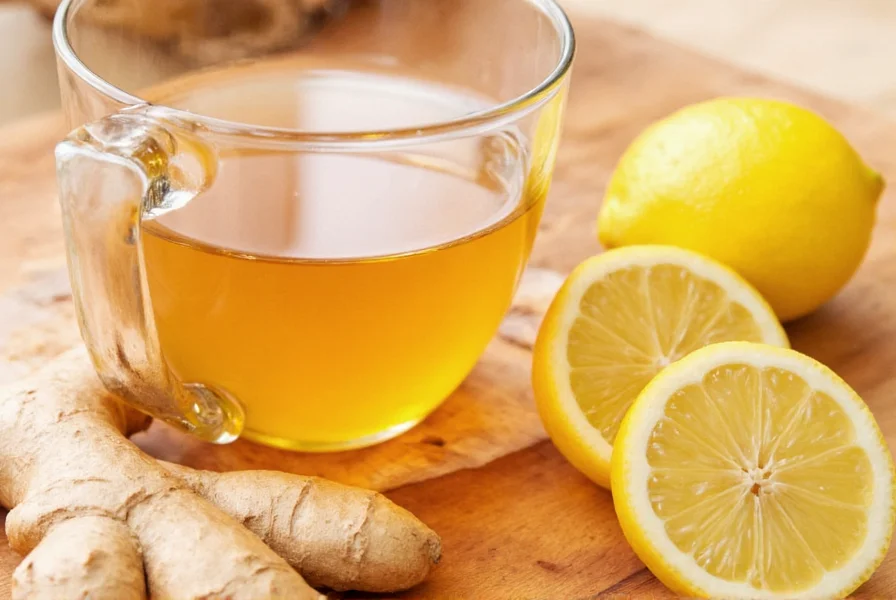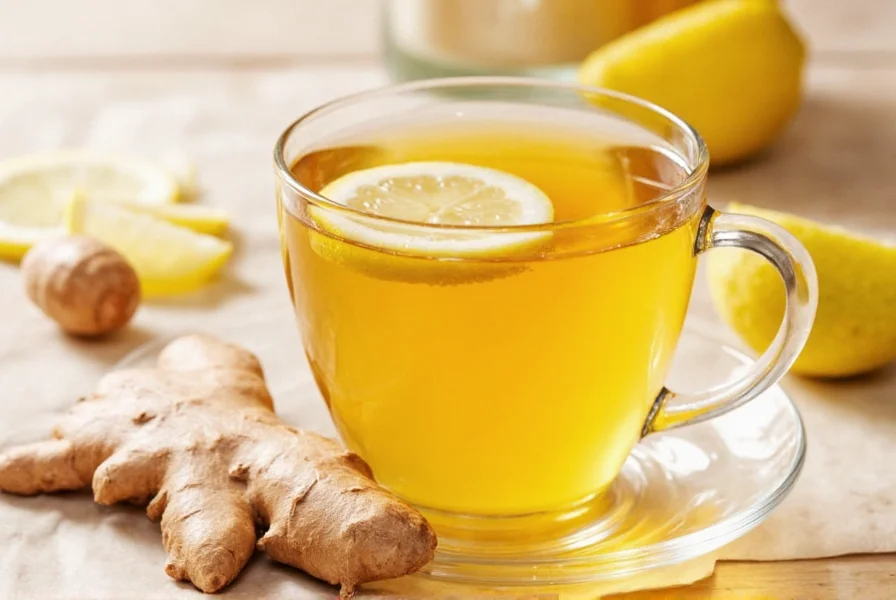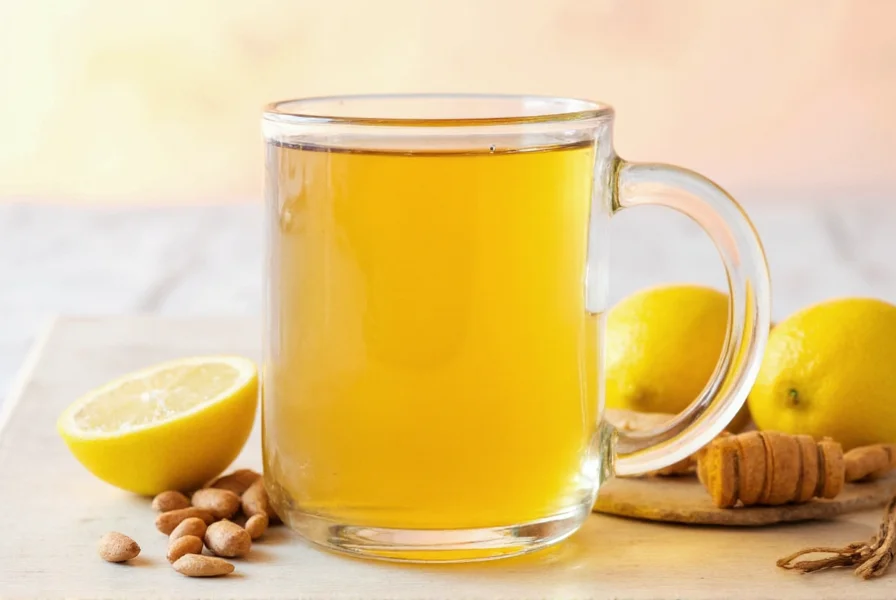Ginger tea with honey and lemon has become a popular natural remedy worldwide, and for good reason. This simple beverage combines three powerful ingredients that work synergistically to support your health. Understanding the science behind this combination helps you maximize its benefits while avoiding common preparation mistakes that reduce effectiveness.
The Science-Backed Health Benefits
Research shows ginger tea with honey and lemon offers several evidence-based health advantages. Ginger contains gingerol, a bioactive compound with potent anti-inflammatory and antioxidant properties. A 2019 review in Nutrients confirmed ginger's effectiveness in reducing nausea and supporting digestive health. Honey, particularly raw varieties, demonstrates antimicrobial activity that can soothe irritated throats. The vitamin C in lemon enhances iron absorption and supports immune function, though the amount in a typical serving remains modest.
When preparing ginger lemon honey tea for cold relief, the warmth provides immediate comfort while the ingredients work together. The steam helps clear nasal passages, ginger reduces inflammation in the respiratory tract, honey coats and soothes the throat, and lemon provides hydration with electrolytes. However, it's crucial to understand this beverage complements but doesn't replace medical treatment for serious conditions.

Optimal Preparation Method
Many people make critical errors when preparing ginger tea honey lemon that diminish its effectiveness. The ideal preparation sequence matters significantly:
| Ingredient | Amount | Preparation Timing | Purpose |
|---|---|---|---|
| Fresh ginger root | 1-2 inches, sliced thin | First, steep 10-15 min | Releases gingerol compounds |
| Lemon juice | Half lemon (15-30ml) | After ginger steeping | Preserves vitamin C |
| Honey | 1-2 teaspoons | When cooled below 40°C | Maintains enzymatic activity |
Adding honey to boiling water destroys beneficial enzymes and antioxidants. Always wait until your ginger tea has cooled slightly before adding honey to preserve its medicinal properties. Similarly, adding lemon too early can cause bitterness as the heat breaks down citrus compounds.
When Ginger Tea Works Best
Understanding the best time to drink ginger tea with honey helps maximize benefits. Morning consumption supports digestion throughout the day, while evening consumption can promote relaxation. For digestive issues, drink 20 minutes before meals. When addressing sore throats or cold symptoms, consume every 2-3 hours while symptoms persist.
However, certain populations should exercise caution. People with gallstone disease should consult doctors before regular ginger consumption, as it stimulates bile production. Those managing diabetes should monitor honey intake, as even natural sweeteners affect blood sugar. Pregnant women can safely consume moderate amounts (up to 1g ginger daily), but should avoid excessive quantities.
Debunking Common Myths
Despite popular claims, ginger tea with honey and lemon doesn't cure serious illnesses. While it provides symptomatic relief for colds and mild digestive issues, it doesn't eliminate viruses or bacteria causing infections. The vitamin C content from one lemon slice remains insufficient to significantly boost immunity beyond daily requirements.
Research published in Complementary Therapies in Medicine shows ginger tea reduces nausea severity by approximately 30% compared to placebo, but doesn't eliminate it completely. Similarly, honey provides temporary sore throat relief but doesn't shorten illness duration. Understanding these realistic expectations prevents disappointment and promotes appropriate use of this natural remedy.

Creating Your Perfect Blend
Personalizing your ginger tea honey lemon recipe proportions enhances both flavor and effectiveness. Start with the basic ratio of 1 inch ginger to 8oz water, then adjust based on your needs:
- For stronger digestive support: Increase ginger to 2 inches
- For maximum sore throat relief: Add extra honey (1.5 tsp)
- For immune support: Include both lemon zest and juice
- For better sleep: Add a cinnamon stick during steeping
Experiment with steeping times to find your ideal balance. Shorter steeping (5-7 minutes) creates a milder flavor suitable for daily consumption, while longer steeping (15-20 minutes) extracts more potent compounds for therapeutic use during illness. Remember that darker tea indicates higher concentration of active compounds.
Frequently Asked Questions
How often can I safely drink ginger tea with honey and lemon?
Most adults can safely consume 1-3 cups daily. Those using it for therapeutic purposes during illness may drink up to 4 cups for short periods (3-5 days). Excessive consumption (more than 4g ginger daily) may cause heartburn or digestive discomfort in sensitive individuals.
Does the temperature affect the benefits of ginger tea with honey and lemon?
Yes, temperature significantly impacts effectiveness. Ginger compounds extract best in hot water (90-95°C), but honey's beneficial enzymes degrade above 40°C. Always add honey after the tea has cooled slightly. Lemon's vitamin C remains more stable when added after the initial steeping period.
Can children consume ginger tea with honey and lemon?
Children over 1 year can safely consume this tea in moderation. Never give honey to infants under 12 months due to botulism risk. For children 1-5 years, limit to half-cup servings with reduced honey (1/2 tsp). Consult a pediatrician before regular consumption for children with chronic health conditions.
How long does it take to feel the benefits of ginger tea with honey and lemon?
For digestive issues, effects typically begin within 15-30 minutes. Sore throat relief from honey usually occurs within 20 minutes. Immune support benefits require consistent daily consumption over weeks. Maximum benefits for chronic conditions may take 4-6 weeks of regular use at appropriate dosages.
Can I use ground ginger instead of fresh root in my tea?
While fresh ginger root provides superior flavor and higher gingerol content, ground ginger works as a substitute. Use 1/4 teaspoon ground ginger per cup of water. Note that processed ginger contains lower concentrations of active compounds, so you may need to increase the amount slightly for similar effects.











 浙公网安备
33010002000092号
浙公网安备
33010002000092号 浙B2-20120091-4
浙B2-20120091-4